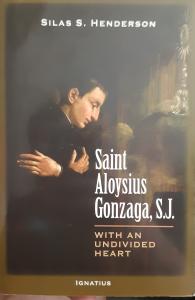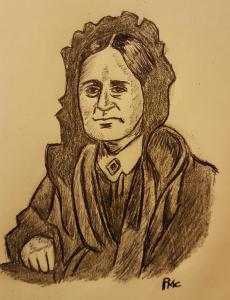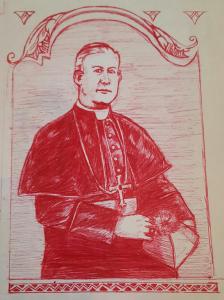 The New York Mission to Deaf Mutes
The New York Mission to Deaf Mutes
By Rev. Joseph Rockwell, S.J.
The Woodstock Letters, Vol. XXVIII (1899): 248-252.
For some years back, a Father of the Society has been in charge of the deaf mutes of New York City. He preaches to them in the sign language every Sunday afternoon, at St. Francis Xavier’s, and looks after the spiritual interests of the deaf and dumb, who are scattered over the large area of New York City, Brooklyn, and Jersey City. Father Becker has been in charge during the past year, and he has been unsparing in his efforts to bring joy and brightness into the lives of our deaf and dumb friends. Some do not come regularly to the Sunday afternoon instructions, on account of distance or poverty. Others, who would come, stay away for the ordinary pleas common to weak human nature— apathy, ignorance, and the hundred and one fictitious excuses which the world, the flesh, and the devil invent. In order to stir these up and to stimulate even the fervent ones to higher and better things, a week’s mission was given in 1897 and again in 1898, with most encouraging and consoling results. Again this year a similar mission was given with equally gratifying results. A week’s mission was given to the men and another to the women. As it is impossible to have all the exercises of a mission, owing to the distances which the deaf have to come, only one service a day was had; viz., the instruction, sermon and benediction in the evening.
Every evening Father Becker opened with an instruction, and after half an hour’s signing he was succeeded by the writer, who gave a mission sermon on the truths of the first week of the Spiritual Exercises [of St. Ignatius Loyola]. After the sermon, benediction of the Blessed Sacrament was given. The academic hall, where the Sunday afternoon instructions are regularly held, was in use for other purposes on some of the evenings, and we held our exercises in the lower church during the men’s mission. We found the church very well suited to our purpose, for the light was perfect. This is the great problem to be considered in preaching to the deaf. If the light is too poor you may as well adjourn. You must have plenty of light on the face of the speaker, not behind him, for bright lights dazzle the eyes of the audience. In the church we found everything perfectly satisfactory, and as the upper church was used for the Lenten services for the people of the parish, we had the whole lower church to ourselves. A few outsiders, that is, persons not deaf and dumb, came, out of curiosity maybe, but they were welcome, for the more who know about the work for the deaf and dumb, the more chances there will be of spreading an interest in the work and saving this unheeded flock. The average attendance at the men’s mission was seventy-five each night, at the women’s mission eighty-five each night. About one hundred and sixty confessions were heard; a most consoling result indeed. One woman came a distance of four miles with an infant in her arms, having no one with whom to leave the child. This is a little indication of the general good will and earnestness.
The women’s mission was held during Holy Week, and on Easter we had the solemn closing of both missions. On that day a greater crowd was present than I ever witnessed. Nearly 150 appeared in all their Easter regalia, and a spirit of joy and happiness pervaded the whole assembly. The mothers brought their children, and while the priest was speaking eloquently with his fingers, the children were chattering; for they were not deaf and dumb. Perhaps you are not aware that the offspring of deaf and dumb parents are rarely deaf. Lately some Prof. Bell of Washington wrote a newspaper article foreboding ill to the race by the intermarriage of deaf mutes and the hereditary transmission of the malady. I think his views are exaggerated. Anyhow it is foolish and impossible to prevent their maariages. A deaf mute should never marry a person who is not deaf. Their condition is too unequal, and in a short time it inevitably leads to serious domestic disturbance. Even though the children of these marriages be not deaf and dumb, still they grow up practically deaf and dumb, until they are of school age, because the parents cannot teach them how to talk, and the children, living in the midst of silence, find their lips sealed through want of use. In spite of all this, the children present on Easter day succeeded in making their presence visible and audible, but they did not disturb anyone but the preacher, as the audience was unconscious of their chattering. He ignored it, and so all went on merrily, and everyone was happy, even the children.
At the end, the Papal Benediction was given, and articles of piety were blessed. All showed their appreciation of the mission by saying that they wished it would last a week longer. They are indeed grateful and appreciative and capable of elevation, if only we take hold and do a little something for them. A practical proof of the good done, may be gathered from the fact that two notorious drunkards were so impressed by the denunciation of the curse of intemperance, that they took the pledge for five years. They may not keep their promise, but whether they do or not, the fear of God entered their hearts for the time being.
A ludicrous incident occurred on the Saturday evening on which the women were going to confession. Owing to the many choir rehearsals for Easter, it happened that the hall in which the deaf were assembled was needed for a choir rehearsal. So we gave the front of the hall to the choir, and the rear to the deaf and dumb. The seating capacity of the hall is about 400. After the confessions were over, the deaf and dumb were waiting, eager to have a few words of advice before going home. The circumstances were most unfavorable. To get up and preach to a congregation, in the presence of a gesticulating choirmaster and in the strange midst of a medley of harmony and discord, was something that could hardly be exacted of the bravest of men. However, the deaf insisted. They were not a bit disturbed by the noises of the choir, and choir was not a bit disturbed by their silent discourses, as the deaf ocucpied the rear of the hall. So the problem resolved itself into this—had the preacher sufficient power of concentration be oblivious or deaf to the shrieks that were dinning in his ears? It would be a battle of silence against noise. The choir exercise consisted chiefly of the mechanical reading of notes. It was not music, but downright noise. He continued to try. The next problem was, to find a place to stand, for you must be elevated to be seen by the deaf. The platform, his usual point of vantage, had been usurped by the choir leader. He began on the floor, but all the deaf were craning their necks to try to see him; so he mounted a bench, and then was witnessed a scene which would be characterized as a comedy by a dramatic critic. Just picture it to yourselves. I leave it to your imaginations—the simultaneous progress of a choir rehearsal and of a mission sermon. I believe the deaf and dumb hardly appreciated the ludicrousness of the situation, they were so eager to get some profitable advice, but with me it was different; I was quite penetrated with a sense of the comical in the surroundings, and I could not resist the temptation to amuse the deaf by commenting on the discordant turbulence which was around them. I then passed on to some salutary remarks on the way to prepare for the morrow. It was too much of a strain on my nerves to stand it long, and after about ten minutes I dismissed them with a blessing.
In New York the deaf show the results of the care which has been bestowed on them by the Sisters and by our Fathers. There are quite a number of weekly communicants among them, who are exemplary in their lives and are striving as earnestly and successfully as other people to be good. On the other hand there are very many who are not models at all, for the opposite reasons—want of care, and the contaminating influences of education at non-Catholic, or as they are stupidly and erroneously called non-sectarian schools. You can see the two classes in close contrast in New York; and from the study of their condition there, those who are interested in their well-being can get encouraging lessons. While their condition is far from ideal, it displays many consoling and gratifying features which show plainly enough what can be accomplished, and what is especially needed for their well-being. In a former article I have described at length the condition of the deaf in New York. Therefore I shall not detain you longer in that great city.











